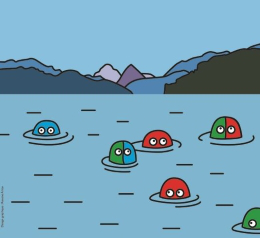The programme will span over 3 weeks.
During the first 2 weeks, we will address two topics per day among those listed below with 2 oral presentations per day. The schedule will be finalized later, the rough organization is:
- The discussions during the first week will be focused on the production mechanisms, fragmentation, coalescence and hadronization in vacuum, the characterization of the initial state of the collision and new observables.
- During the second week, scientific discussions will be around energy loss, coalescence and recombination in the medium, benchmarking heavy flavour and quarkonium models to extract medium parameters, bridging the gap between small and large systems.
During the third week, we will have a workshop aiming at summarising our discussions as well as touching upon connected topics.
-
Energy loss of heavy quarks
Status and prospects of modeling and description of open heavy flavour and quarkonia production in medium
- What do open HF and high pt quarkonia measurements tell us ?
- Evaluation of the medium transport properties: status
-
Coalescence and recombination in the medium
- Is there an onset of suppression ?
- Can other states help? : Bc, Upsilon…
-
Benchmarking heavy flavour and quarkonium models to extract medium parameters
Coherent description of open heavy flavour and quarkonium modeling in medium to characterize the medium
- Model status
- Unifying constraints for open and hidden heavy flavour production
-
Characterizing the initial state of the collision
Characterization of the initial state of the collision
- Photoproduction (UPC, PC) as a probe of nuclei structure;
- GPDs, PDF and TMDs;
- Saturation, non-linear effects and BFKL dynamics;
- Collectivity: do we understand its origin?
-
Bridging the gap between small and large systems
Can particle production in small and large systems be described within a model ?
- Measurements as a function of charged-particle multiplicity (prospects, bias, limitation)
- Modeling the events from pp to AA.
-
Production mechanisms in vacuum: data vs. theory uncertainties
Exploiting data to constrain model calculations
- cross sections, ratios, feed-down effects
-
Fragmentation, coalescence and hadronization in vacuum
Understanding and modeling particle production in vacuum: fragmentation, coalescence and hadronization.
- Meson to baryon production in all systems
- Can other excited states help? X(3872)...
-
New observables
Recent or new ideas and measurements
- associated particle production (DPS, TPS, correlations)
- jets (dead-cone, fragmentation, de-clustering)

